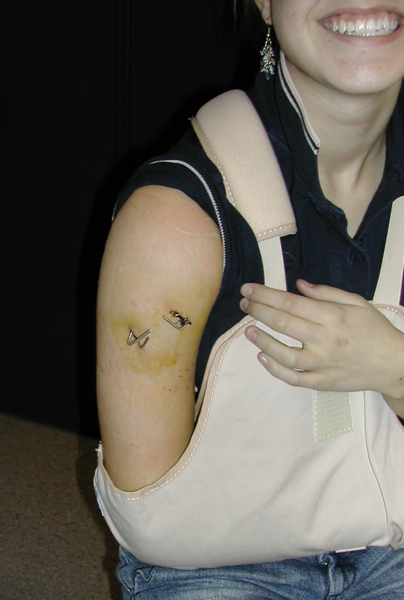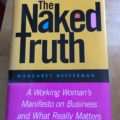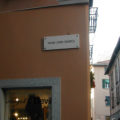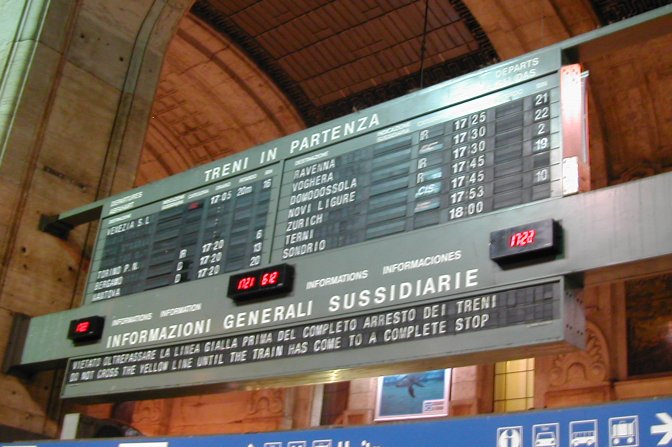I have suddenly landed a temporary but demanding job: nursing my daughter. Ross fell off her horse Sunday afternoon, onto hard ground, and broke her humerus just below the shoulder joint.
The emergency room was humming – it was a beautiful day, everyone was out getting hurt. Just before we got there, an ambulance had brought in a young man in motorcycle leathers, who looked pretty severely injured. According to a conversation I heard among the nurses, Lecco gets a lot of motorcyclists – and accidents – on sunny weekends. Another young man had been out hiking in the mountains, slipped on a patch of ice, and banged his head and chin.
They quickly got Ross through an initial examination and x-ray, drew blood, then took us up to a room on the orthopedic ward. Ross was trembling when the anesthesiologist came to talk to her; given recent family horror stories with hospitals, we were all terrified that she had to go under anesthesia. But those stories took place in the US and the UK. So far, I have no complaints about Italian health care. [later on, we had an Italian horror story to add to the family history]
The anesthesiologist gave her a sedative, and off we went to surgery. Ross told me later that, by the time they actually got her into the operating room, she was giggling and wondering why she had been so scared. She lay there looking at all the bustle around her, wondering if they had a machine that goes “ping!”
We had arrived at the emergency room at 5:15; by 7:15 she was under. The surgeon had to pull the bone back into place, and then put in three wires to hold it while it heals; Ross is also wearing a sling-and-strap to hold her arm against her body. Her right arm. No drawing in art school for a while.
Giulio (owner of the private stable where we now keep Hamish) and Viola (his daughter, Ross’ classmate and riding buddy) came racing down from their ski weekend to be there, and passed the time during surgery regaling me with stories about their numerous family sports injuries (they ride and ski, Giulio and Viola compete seriously at both). As Giulio pointed out, it’s lucky this happened right before Christmas vacation, so Ross won’t miss too much school.
Giulio also demonstrated the usefulness of the small-town grapevine: when he heard the name of the surgeon, he called his sister-in-law, who happens to work at the hospital as an orthopedic surgical nurse. She said that we were lucky: this surgeon’s a good one. And she came by the next morning to see us in person. If we need any inside information on this case, we’ll know where to get it.
There was a spare bed in Ross’ room, so I was allowed to stay with her. The first night she was in a lot of pain, understandably, but since then has bounced back with most of her usual energy and sense of humor. They let her out yesterday (Tuesday), and today she’s gone back to school (the doctor said there was no reason she shouldn’t, as long as her arm doesn’t get bumped). She’ll need to have the bandage changed every 3 or 4 days, to ensure that no infection enters where the wires are; those will come out after 25 days, and she has to keep wearing the sling til then. So I’ll be accompanying her to doctors a lot, as well as helping her dress, wash her hair, etc. As I said, it’s a job. But that’s what moms are for.
Jan 19, 2004
Rossella‘s arm has healed well. The wounds (from the surgery) were so clean that her bandage needed changing only three or four times over the month. Last Tuesday we went in for a final x-ray and, seeing that everything looked fine, the doctor pulled out the wires, using a pair of common (even somewhat rusty) household pliers. According to Ross, it felt weird, and the idea was gross, but it didn’t actually hurt.
So now she’s down to band-aids over the holes, and only needs to wear the sling at night. We’re trying to schedule physical therapy; in the meantime, she can use her right arm again, as long as she avoids swinging it out from the shoulder – no dancing the Funky Chicken..
The hospital staff were amused: Ross is the only patient in their experience who wanted a picture (while the wires were still sticking out – her arm looked like a construction site), and to keep the wires as a souvenir. But, as they noted, this attitude coincided with the Clockwork Orange t-shirt she was wearing.
Of course she wanted to keep the wires; she couldn’t wait to tell her schoolmates: “Piercing? Hah! I’ll show you REAL piercing.”
Apr 27, 2004
Ross has healed up fine from breaking her arm in December, and is back in the saddle of her beloved Hamish. She’s had some moments of fear, but is gradually feeling comfortable riding again (it was totally up to her to do so; her father and I might have been just as happy for her to give it up now).












